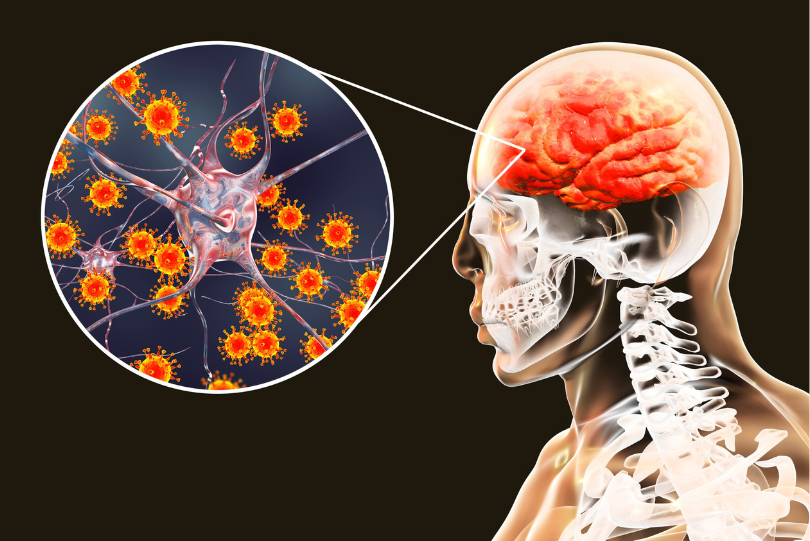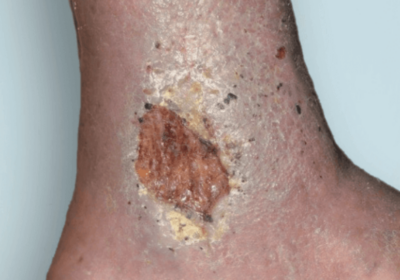Ayurvedic Encephalitis Treatment In Kerala

The illness known as encephalitis is characterized by inflammation of the brain tissue, which may result in life-threatening neurological complications.
WHAT IS ENCEPHALITIS?
The term “encephalitis” describes inflammation of the brain brought on by autoimmune diseases, viruses, or other causes. From minor headaches and fevers to more serious side effects like seizures, changed mental status, and even paralysis, it can cause a wide range of symptoms.
POST ENCEPHALITIS REHABILITATION TREATMENT IN AYURVEDA
Restoring general health and neurological function is the goal of Ayurvedic post-encephalitis therapy. Comprehensive rehabilitation may be necessary to address neurological abnormalities resulting from encephalitis, an inflammation of the brain frequently caused by a viral infection. Ayurveda is a historic Indian medical system that provides treatments that target the body and mind renewal, strengthening, and balancing. The following are some broad strategies that Ayurveda may use to help with post-encephalitis rehabilitation:
PANCHAKARMA
- Vamana (Therapeutic Emesis): This helps in detoxifying and balancing the body by expelling toxins through the upper gastrointestinal tract.
- Virechana (therapeutic purgation): A cleansing technique that passes via the lower gastrointestinal tract to eliminate built-up toxins from the body.
- Nasya (Nasal Administration of Medication): This can help with neurological disorders by clearing and revitalizing the head and neck area through the nasal passages with herbal oils or powders.
HERBAL REMEDIES:
Ayurvedic herbs like :-
- Ashwagandha (Withania somnifera): This adaptogenic herb helps reduce stress, supports nerve function, and aids in overall recovery.
- Brahmi (Bacopa monnieri): Known for its neuroprotective and cognitive-enhancing properties, Brahmi can be beneficial in post-encephalitis recovery.
- Shankhpushpi (Convolvulus pluricaulis): Helps calm the mind, improve memory, and reduce inflammation in the brain.
- Jatamansi (Nardostachys jatamansi): Used to strengthen the nervous system, improve cognitive function, and promote overall recovery.
- Herbal formulations like Saraswatarishta, Brahmi Ghrita, and Ashwagandharishta may be prescribed based on individual symptoms.
DIETARY RECOMMENDATIONS:
While diet alone cannot cure encephalitis, a healthy diet can support overall health and aid in recovery. Here are some dietary recommendations:
- Hydration: Ensure adequate hydration by drinking plenty of water. Dehydration can exacerbate symptoms and hinder recovery.
- Balanced Diet: Focus on a balanced diet rich in fruits, vegetables, whole grains, lean proteins, and healthy fats. This provides essential nutrients necessary for overall health and immune function.
- Antioxidant-Rich Foods: Include foods high in antioxidants, such as berries, leafy greens, nuts, seeds, and brightly colored fruits and vegetables. Antioxidants help reduce inflammation and support immune function.
- Omega-3 Fatty Acids: Incorporate sources of omega-3 fatty acids, such as fatty fish (salmon, mackerel, sardines), flaxseeds, chia seeds, and walnuts. Omega-3s have anti-inflammatory properties and support brain health.
- Protein: Consume adequate protein from sources like lean meats, poultry, fish, eggs, dairy products, legumes, and tofu. Protein is essential for tissue repair and immune function.
- Limit Sugary and Processed Foods: Minimize intake of sugary snacks, processed foods, and refined carbohydrates. These can contribute to inflammation and may impair immune function.
- Probiotics: Consider including probiotic-rich foods like yogurt, kefir, sauerkraut, and kimchi. Probiotics support gut health, which is linked to immune function and overall well-being.
- Vitamin D: Get sufficient vitamin D through sunlight exposure and/or dietary sources like fatty fish, fortified dairy products, and supplements if necessary. Vitamin D plays a role in immune function and may help reduce inflammation.
- Vitamin C: Include foods rich in vitamin C, such as citrus fruits, strawberries, kiwi, bell peppers, and broccoli. Vitamin C supports immune function and may help reduce the severity and duration of infections.
- Stay Cautious with Supplements: While certain supplements may be beneficial, it’s important to consult with a healthcare professional before taking any supplements, as they can interact with medications and affect health outcomes.
YOGA AND MEDITATION:
- Specific yoga postures (asanas) and breathing exercises (pranayama) to improve circulation, strengthen muscles, and enhance neurological function.
Here are some yoga asanas that can be practiced cautiously and gently to promote relaxation and support overall health while recovering from encephalitis:
- Savasana (Corpse Pose): This asana is a relaxation posture that helps calm the mind and body. Lie down on your back with arms and legs comfortably apart. Close your eyes and focus on deep, slow breathing.
- Balasana (Child’s Pose): This gentle resting pose helps release tension in the back, shoulders, and chest. Kneel on the floor, touch your big toes together, and sit on your heels. Then, lower your torso between your knees, extend your arms forward, and rest your forehead on the floor.
- Viparita Karani (Legs-Up-the-Wall Pose): This pose promotes relaxation and can help reduce stress. Lie on your back with your legs extended up the wall. Keep your arms by your sides with palms facing up. Relax and breathe deeply.
- Bhujangasana (Cobra Pose): This gentle backbend helps improve circulation and can be beneficial for strengthening the spine. Lie on your stomach, place your palms under your shoulders, and gently lift your chest off the floor while keeping your pelvis grounded.
- Marjariasana-Bitilasana (Cat-Cow Pose): This flowing movement helps to stretch the spine and release tension in the back and neck. Start on your hands and knees, arch your back upwards (like a cat) while exhaling, then drop your belly and lift your gaze (like a cow) while inhaling.
- Supta Baddha Konasana (Reclining Bound Angle Pose): This restorative pose opens the hips and relaxes the body. Lie on your back, bend your knees, and bring the soles of your feet together, allowing your knees to drop out to the sides.
Yoga should be practiced gently and mindfully, listening to your body and avoiding any strain or discomfort. The focus should be on relaxation, deep breathing, and gentle movement to support overall well-being during recovery.
- Meditation can complement traditional medical treatment and rehabilitation for encephalitis.
- Meditation and mindfulness techniques to reduce anxiety, improve focus, and support overall mental well-being.
LIFESTYLE MODIFICATIONS:
Ayurveda emphasizes maintaining a regular daily routine (dinacharya), adequate rest, and stress reduction techniques like pranayama (breathing exercises) and mindfulness.
NERVE STREGTHENING THERAPIES:
External therapies like:
- Abhyanga (herbal oil massage),
- Shirodhara (pouring of medicated oil on the forehead)
- Pizhichil (medicated oil bath) to nourish and strengthen nerves.
PHYSIOTHERAPY:
Physiotherapy plays a crucial role in the management of encephalitis, a condition characterized by inflammation of the brain. The specific physiotherapy management for encephalitis at our Maurya Centre would typically focus on several key areas:
- Assessment and Evaluation: A thorough assessment of the patient’s neurological status, including motor function, sensory function, balance, coordination, and cognitive abilities, is essential to determine the extent of impairment and plan appropriate interventions.
- Mobility Training: Encephalitis can result in muscle weakness, paralysis, and difficulties with movement. Physiotherapists work to improve mobility through exercises, stretching, and strengthening programs tailored to the individual’s needs.
- Gait Training: If the patient experiences difficulties with walking or balance, gait training may be prescribed to improve walking patterns and reduce the risk of falls.
- Range of Motion Exercises: Encephalitis can lead to stiffness and reduced range of motion in the joints. Physiotherapy interventions may include passive and active range of motion exercises to maintain or improve flexibility.
- Balance and Coordination Exercises: Encephalitis can affect balance and coordination, increasing the risk of falls. Physiotherapists may incorporate exercises targeting these areas to enhance stability and prevent accidents.
- Functional Rehabilitation: Physiotherapy aims to help patients regain independence in daily activities such as dressing, grooming, and self-care. This may involve practicing specific tasks and using adaptive equipment as needed.
- Respiratory Support: In severe cases of encephalitis, respiratory muscles may be affected, leading to breathing difficulties. Physiotherapists can provide respiratory exercises and techniques to improve lung function and prevent complications such as pneumonia.
- Pain Management: Encephalitis may cause pain and discomfort, which can be addressed through various physiotherapy modalities such as massage, heat therapy, or electrical stimulation.
- Education and Support: Physiotherapists play a vital role in educating patients and their caregivers about the condition, teaching safe movement techniques, and providing support throughout the rehabilitation process.
- Long-Term Management and Follow-Up: Recovery from encephalitis can be a gradual process, and physiotherapy may be required over an extended period. Regular follow-up appointments allow for adjustments to the treatment plan based on the patient’s progress.
Overall, physiotherapy intervention at our Maurya Centre for encephalitis management aims to maximize functional abilities, enhance quality of life, and promote long-term recovery. The specific approach may vary depending on the individual’s unique needs and the severity of their condition.
PROGNOSIS AND PREVENTION:
Severe cases of encephalitis may result in permanent brain damage or even death, although minor cases may pass away with treatment. Vaccination against viral diseases and maintaining good hygiene are two examples of preventive strategies.
Through knowledge about encephalitis’s causes, symptoms, and available treatments, people can take preventative measures to safeguard their health and seek prompt medical help when necessary.
Speak with our medical experts for additional details on encephalitis and how it is treated. Remain educated and maintain your health!
Follow-up Care:
- Regular follow-up consultations to monitor progress and make necessary adjustments to the treatment plan.
- Long-term wellness strategies to prevent relapse and maintain optimal health.
It’s essential to consult our qualified Ayurvedic practitioner who can assess your specific condition, customize a treatment plan, and closely monitor your progress throughout the rehabilitation process. Additionally, integrate Ayurvedic treatments with conventional medical care as needed for comprehensive management of post-encephalitis symptoms.
DISCLAIMER: The information provided in this article is intended solely for educational purposes. Treatment decisions should be made exclusively by a well-qualified Ayurvedic physician. Self-medication is strongly discouraged.




